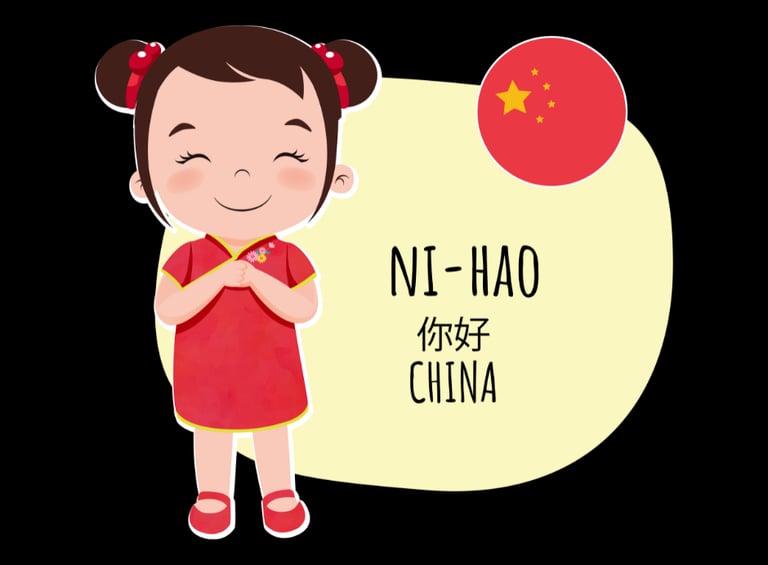CHINESE MANDARIN
Learning Chinese is like upgrading your brain’s software—suddenly, 1.4 billion people make sense!
It opens doors to business, culture, kung fu wisdom, and ordering dumplings like a local.
ROADMAP TO LEARN CHINESE LANGUAGE
HSK1 JOURNEY
What You Will Learn in HSK 1
HSK 1 is the official beginner level of Mandarin Chinese. It’s designed for people who are starting from scratch and want to build a strong, practical foundation in the language. Here’s what you’ll be learning:
📘 1. Vocabulary – 400-500 Everyday Words
You’ll learn 400-500 of the most essential words used in real-life conversations. These include:
Basic greetings and polite expressions (e.g., hello, thank you, sorry, goodbye)
Numbers and counting (from 1 to 100 and beyond)
Time expressions (days of the week, months, telling the time, words like “today,” “tomorrow,” “now”)
Family members and people (e.g., mother, father, teacher, friend, child)
Common places (e.g., home, school, store, hospital)
Objects around you (e.g., book, clothes, phone, bag, money)
Food and drink items (e.g., rice, water, fruit, tea)
Daily activities and actions (e.g., to eat, to sleep, to go, to look, to do, to work)
Feelings and descriptions (e.g., happy, big, small, beautiful, tired)
Pronouns and question words (e.g., I, you, we, who, what, where)
🧱 2. Grammar & Sentence Building
You’ll learn how to create clear, simple sentences in Chinese using the correct structure. Topics include:
How to make basic statements (e.g., “I am a student,” “She likes coffee”)
How to ask yes/no questions
How to use question words like “who,” “what,” “where”
How to say “this,” “that,” “here,” “there”
How to form negative sentences (e.g., “I don’t like it”)
How to express possession (e.g., “my friend,” “his book”)
How to use numbers and measure words (used when counting things)
Introduction to word order and how Chinese sentences are structured
🎧 3. Listening Skills
You’ll train your ears to understand spoken Mandarin at a slow and clear pace. By the end of HSK 1, you’ll be able to:
Understand short conversations about everyday topics
Recognize common words and phrases when spoken
Follow basic instructions or questions
Pick out key details from short audio recordings
🗣️ 4. Speaking Skills
You’ll gain confidence in saying basic things in Chinese using correct pronunciation and tones. You’ll practice:
Introducing yourself and others
Asking and answering simple questions
Expressing likes, dislikes, and needs
Talking about daily routines and plans
Using simple expressions in real situations
📖 5. Reading Skills
You’ll begin reading simple texts and signs using basic Chinese characters. You’ll learn:
How to read short sentences using the vocabulary you’ve learned
How to understand menus, labels, signs, and simple messages
How to recognize key characters and match them with their meanings
✍️ 6. Writing Skills
You’ll start writing short words and phrases using the correct stroke order. You’ll learn:
The structure of basic Chinese characters
How to write personal information (like name and nationality)
How to build and write simple sentences on your own
🌐 7. Everyday Communication
By the end of HSK 1, you will be able to:
Introduce yourself and talk about your background
Ask for directions, time, and prices
Communicate politely in shops, restaurants, and public places
Understand and respond to basic questions
Handle simple conversations during travel or social interactions
💡 Why It’s Worth It
HSK 1 covers a huge amount of practical, real-life language in a very beginner-friendly way. Even with just this level, you’ll be able to:
Start communicating with native speakers
Travel more confidently in Chinese-speaking areas
Understand key elements of Chinese culture and daily life
Build a strong base for higher levels of Chinese learning
HSK2 JOURNEY
What You Will Learn in HSK 2
HSK 2 is the next step after HSK 1 and is ideal for learners who have a basic understanding of Chinese and want to expand their vocabulary, sentence patterns, and ability to communicate in daily situations. It introduces more real-life topics, improves fluency, and helps you understand and express more complex ideas.
📘 1. Vocabulary – 400-500 New Words (Total: 800-1000 Words)-HSK1+HSK2
In HSK 2, you’ll learn an additional 400-500 practical words on top of what you learned in HSK 1. These new words allow you to:
Describe actions in more detail (e.g., to help, to wait, to dance, to walk)
Talk about weather and nature (e.g., sunny, cloudy, hot, cold)
Use directions and locations (e.g., left, right, front, back)
Describe personal feelings (e.g., happy, tired, hungry, busy)
Talk about time more precisely (e.g., minute, hour, morning, evening)
Name common objects (e.g., eyes, hands, roads, tickets)
Express opinions and preferences (e.g., think, feel, want, hope)
Use more useful question and linking words (e.g., because, so, really?)
🧱 2. Grammar & Sentence Structure
HSK 2 introduces more grammar that helps you form longer, clearer, and more accurate sentences. You will learn how to:
Make comparisons (e.g., A is taller than B)
Express past actions using time words and particles
Talk about future intentions (e.g., I will go, I want to buy)
Use conjunctions like "but", "because", and "so"
Add more details and modifiers to your sentences
Ask more complex questions (e.g., What do you think about this?)
🎧 3. Listening Skills
Listening becomes more realistic in HSK 2. You'll practice with:
Short conversations that involve two speakers
Descriptions of situations (e.g., where someone is, what they’re doing)
Common announcements (e.g., in school or public places)
Questions that require deeper understanding (e.g., “Why is she going there?”)
You'll start to listen for meaning, not just words.
🗣️ 4. Speaking Skills
With your expanding vocabulary and grammar, you’ll now be able to:
Give simple directions (e.g., turn left, go straight)
Describe people, places, or things in more detail
Talk about daily plans or routines
Invite, suggest, or express feelings (e.g., “Let’s eat,” “I’m happy today”)
Have basic conversations without much help
📖 5. Reading Skills
HSK 2 takes your reading to the next level. You’ll be able to:
Read and understand short paragraphs
Follow conversations in text format
Recognize around 800-1000 characters
Understand the meaning even if you don’t know every word (thanks to context clues!)
✍️ 6. Writing Skills
You’ll continue developing your ability to write in Chinese. You’ll learn to:
Write complete sentences with correct grammar
Fill in blanks with appropriate words
Write personal info, short notes, and simple stories
Use characters and word order more confidently
🌐 7. Practical Communication
HSK 2 gives you the tools to handle more real-life situations. By the end of this level, you’ll be able to:
Ask for and give directions
Describe your daily schedule or weekend plans
Talk about weather and health
Make simple phone conversations
Express your thoughts and opinions
Interact at a basic level in travel, work, or school situations
🎯 Why HSK 2 Is Important
HSK 2 is where things start to come together. You’re not just learning words—you’re starting to use them with confidence. You’ll:
Understand more of what native speakers say
Participate in conversations about daily life
Prepare for more serious studies or travel to China
Build a foundation for reaching fluency at higher levels
HSK3 JOURNEY
What You Will Learn in HSK 3
HSK 3 is where things get real and rewarding. You move beyond survival Chinese and start using the language to describe, discuss, explain, and express yourself more naturally. It bridges the gap between basic and intermediate levels—perfect for learners who already have a foundation and are ready to expand their skills significantly.
📘 1. Vocabulary – 600-700 New Words (Total: 1500-1700 Words)
You’ll learn 600-700 more practical and useful words that allow you to talk about real-life topics in much more detail. You'll be able to:
Describe personality and emotions (e.g., friendly, worried, bored)
Talk about hobbies, sports, and free-time activities
Use health-related vocabulary (e.g., fever, medicine, appointment)
Communicate about work and school life
Name more places (e.g., bank, airport, hotel, office)
Use words for tools, transport, and public services
Handle social situations (e.g., invitations, compliments, suggestions)
Understand and express frequency, quantity, and intensity
🧱 2. Grammar & Sentence Building
In HSK 3, your grammar expands so you can form more natural and expressive sentences. You’ll learn how to:
Talk about past experiences using advanced structures
Use comparative and superlative forms correctly
Combine ideas using more linking words (e.g., although, if, when, while)
Use result and direction complements (a special feature in Chinese)
Form complex questions and answers
Make suggestions, requests, and offers politely
Use adverbs and modal words for tone and clarity
🎧 3. Listening Skills
You’ll train your ear to follow longer dialogues and short narratives. Listening tasks will include:
Multi-sentence conversations and announcements
Descriptions involving time, location, and actions
Discussions about daily life, plans, preferences, and problems
Understanding the speaker’s opinion or intention
Catching details from realistic audio contexts
By now, you’re not just understanding words—you’re understanding full messages.
🗣️ 4. Speaking Skills
With HSK 3, you’ll start sounding more natural and spontaneous. You’ll be able to:
Talk about your experiences and describe events
Share your opinions and explain reasons
Use proper tone and phrasing to express yourself
Speak for longer and with more confidence
Interact in common social settings like restaurants, stores, or travel
📖 5. Reading Skills
You’ll be able to read short passages, messages, and stories. Reading skills now include:
Understanding main ideas and details in texts
Recognizing sentence patterns and flow
Reading advertisements, schedules, signs, or short blog entries
Understanding tone, intent, and logical order
✍️ 6. Writing Skills
In HSK 3, your writing becomes more structured and meaningful. You’ll learn to:
Write longer sentences and short paragraphs
Use proper word order and punctuation
Write about events, opinions, and daily experiences
Organize your ideas more clearly on the page
🌐 7. Real-Life Communication
This level gets you ready for basic daily life in a Chinese-speaking environment. After HSK 3, you’ll be able to:
Discuss your plans, past trips, or preferences
Ask for advice or give suggestions
Describe someone’s personality or appearance
Make appointments, ask for help, or express concern
Handle everyday situations in travel, work, or study
Speak politely and appropriately in formal and informal contexts
🎯 Why HSK 3 Is a Big Milestone
HSK 3 is often seen as the moment when learners "graduate from beginner to intermediate." It gives you the power to:
Handle conversations with native speakers at a comfortable level
Function in a Chinese-speaking workplace or school environment
Begin reading simple books, websites, or news
Prepare for trips, internships, or living in China
Build a solid foundation for fluent and confident communication
HSK4 JOURNEY
What You Will Learn in HSK 4
HSK 4 is your gateway to confident communication. At this level, you’ll stop translating in your head and start thinking in Chinese. You’ll learn to express complex thoughts, discuss abstract topics, and handle conversations at work, school, or while traveling.
📘 1. Vocabulary – 700-800 New Words (Total: 2500-2700 Words)
HSK 4 adds another 700-800 highly useful words, bringing you closer to fluency. With these words, you’ll be able to:
Express opinions and emotions clearly (e.g., excited, disappointed, interested, surprised)
Talk about goals, achievements, and personal development
Use words related to career, business, and studies
Handle formal and informal conversations
Talk about society, technology, culture, and values
Use richer words for time, quantity, condition, and possibility
Describe actions in detail, including changes, habits, and consequences
Use idiomatic expressions and common turns of phrase
🧱 2. Grammar & Sentence Structures
HSK 4 introduces more advanced grammar that allows for accurate and natural expression. You’ll learn to:
Use complex sentence structures with multiple clauses
Master the use of result, potential, and directional complements
Express conditions, causes, results, and purposes
Use passive voice, comparisons, and hypothetical situations
Form sentences with conjunctions, contrast, and transitions
Improve use of adverbs, aspect particles, and modal verbs
🎧 3. Listening Skills
Listening at this level involves understanding full conversations, explanations, and narratives. You’ll learn to:
Follow conversations between multiple speakers
Understand discussions on daily life, opinions, or problems
Grasp the speaker’s tone, emotion, and attitude
Listen to short news reports or announcements
Recognize nuance, irony, or subtle meaning in speech
🗣️ 4. Speaking Skills
HSK 4 speaking is all about fluency, accuracy, and confidence. You’ll be able to:
Take part in longer, meaningful conversations
Give clear opinions and justify your choices
Talk about your work, studies, goals, and culture
Tell stories, explain plans, and describe experiences in detail
Handle phone calls, interviews, and social situations in Chinese
📖 5. Reading Skills
Now you can handle paragraphs, stories, and articles with ease. You’ll be able to:
Read texts with multiple topics and points of view
Understand opinions, conclusions, and comparisons
Read about work, news, emotions, and social issues
Pick out important info from notices, instructions, or schedules
Read and understand short essays and letters
✍️ 6. Writing Skills
HSK 4 expects you to write with clarity, variety, and organization. You’ll be able to:
Write short essays with clear structure and logic
Use linking phrases and transitions for flow
Describe past events, future plans, and personal reflections
Explain causes, effects, and reasons
Express ideas using varied sentence types and richer vocabulary
🌐 7. Real-Life & Professional Communication
After completing HSK 4, you’ll be able to:
Manage everyday tasks easily in a Chinese-speaking environment
Communicate at school, in the office, or in social settings
Join group discussions, express agreement or disagreement
Participate in interviews, business meetings, and cultural exchanges
Watch TV shows, YouTube videos, or listen to podcasts with subtitles
🎯 Why HSK 4 Is a Major Achievement
HSK 4 proves you’re no longer just a learner—you’re a confident user of Chinese. It allows you to:
Apply for internships or jobs requiring basic Chinese
Study and travel in China with ease
Understand Chinese media with help from subtitles
Engage in cultural exchange and express your worldview
Prepare to move towards academic or professional fluency (HSK 5 & 6)
HSK5 JOURNEY
What You Will Learn in HSK 5
HSK 5 is all about depth, nuance, and complexity. You’ll not only understand what people are saying—you’ll understand how they’re saying it, why, and with what emotion or intention. It's like moving from “just talking” to thinking and feeling in Chinese.
📘 1. Vocabulary – 1000-1300 New Words (Total: 4000-4300 Words)
This huge vocabulary boost includes words used in:
News and media (e.g., politics, environment, society)
Business and economy (e.g., investments, reports, management)
Literature and storytelling (e.g., emotions, narration, metaphor)
Academic topics (e.g., culture, history, psychology)
Social issues and opinions (e.g., values, habits, traditions)
Workplace Chinese (e.g., communication, teamwork, planning)
Idiomatic and abstract expressions (e.g., expressions of judgment, agreement, regret)
You'll now recognize words used in TV dramas, newspapers, documentaries, podcasts, and even novels.
🧱 2. Grammar & Language Structures
HSK 5 introduces more academic and formal grammar, plus language used in written texts, reports, and speeches. You’ll master:
Advanced connectors (e.g., even though, as a result, on the contrary)
Relative clauses, complex modifiers, and embedded sentences
Advanced complements showing degree, result, or capability
Passive and active transformations in different tones
Sentence patterns used in news reports, essays, and formal talks
Use of 成语 (Chinese idioms) and traditional sayings in context
🎧 3. Listening Skills
Listening now focuses on natural, fast-paced speech. You’ll be able to:
Understand radio shows, interviews, and podcasts
Follow formal speeches, storytelling, and discussions
Identify speaker tone, logic, argument, and purpose
Keep track of conversations that jump topics or include opinions
Catch hidden meaning, sarcasm, or emotional subtext
🗣️ 4. Speaking Skills
Your spoken Chinese becomes more sophisticated and fluent. You’ll be able to:
Speak on academic, cultural, or societal topics
Tell stories, share opinions, and argue points clearly
Join group discussions, lead conversations, and give presentations
Use appropriate tone and register (formal/informal)
Add emotional and rhetorical layers to your speech
📖 5. Reading Skills
HSK 5 prepares you to read native-level materials. You’ll be reading:
Short stories and essays
Newspaper articles and journal entries
Cultural and opinion pieces
Instruction manuals, reports, and event announcements
Literary Chinese in simplified form
You'll focus on reading for logic, theme, argument, and style, not just meaning.
✍️ 6. Writing Skills
You’ll now write with structure, style, and clarity. Writing tasks may include:
Essays that present and support opinions
Stories that include narration, description, and dialogue
Formal messages or reports
Rewriting or summarizing long texts
Using idioms, quotes, or metaphors for style
This prepares you for academic writing or work-related communication in Chinese.
🌐 7. Real-Life & Professional Communication
With HSK 5, you’re ready for real-world immersion. You’ll be able to:
Communicate confidently at work, school, or public settings
Understand films, books, and long-form content
Express views in debates, interviews, or meetings
Interact deeply with native speakers on serious or sensitive topics
Survive and thrive in a Chinese-speaking society
🎯 Why HSK 5 Is a Major Breakthrough
HSK 5 is often the entry point to fluency. It shows that you:
Can live, study, or work in a Chinese environment
Understand and express complex ideas clearly
Are ready to study at a Chinese university
Can build deep relationships with native speakers
Handle Chinese literature, media, and pop culture
HSK6 JOURNEY
What You Will Learn in HSK 6
HSK 6 is where Chinese becomes more than just a language—it becomes a tool for intellectual exploration. You’ll be able to debate, analyze, interpret, and create content in Chinese, across a wide range of topics, in real time, and with nuance.
📘 1. Vocabulary – 2,500+ New Words (Total: Over 7,000 Words)
At this stage, your vocabulary includes words found in:
Academic articles and research papers
Literary works and philosophical essays
Formal debates, speeches, and public announcements
Business, legal, and medical documents
Media commentary, editorials, and film reviews
Cultural idioms, metaphors, and proverbs
Highly abstract and emotional expressions (e.g., to criticize, to hesitate, to tolerate, to exaggerate)
You’ll recognize synonyms, tones, and subtle differences between words—choosing the right word in the right situation becomes second nature.
🧱 2. Grammar & Sentence Structures
HSK 6 grammar is elegant, complex, and exact. You’ll be comfortable with:
Layered sentences with multiple clauses and transitions
Advanced rhetorical patterns used in literature and debate
Complex conditional, hypothetical, and concessive structures
Passive, active, and impersonal forms
The subtle use of aspect particles and modal expressions
Refined sentence linking for smooth argumentation
Expressions involving formality, irony, and emphasis
You won't just build sentences—you'll build ideas in Chinese.
🎧 3. Listening Skills
You’ll be listening to real, fast-paced native speech from various regions, styles, and registers. You'll understand:
Lectures, documentaries, and expert interviews
News analysis, financial reports, and social commentary
Film dialogue, audio dramas, and unscripted discussions
Speakers with different accents and speech speeds
Indirect, figurative, or emotionally loaded language
Contextual clues, irony, and satire
At this point, you'll understand Chinese without subtitles in most cases.
🗣️ 4. Speaking Skills
Speaking at HSK 6 means expressing ideas with nuance, precision, and cultural awareness. You’ll be able to:
Participate in formal debates, discussions, and Q&A sessions
Give presentations, speeches, or pitches in Chinese
Handle interviews, negotiations, or conflict resolution
Tell stories with emotional color, pacing, and style
Shift your tone between academic, professional, casual, and humorous
Use idiomatic and elegant language fluently
Your Chinese won’t just be correct—it’ll be impressive.
📖 5. Reading Skills
Reading becomes a whole new experience at this level. You’ll be able to:
Read and analyze long literary texts and essays
Understand formal reports, contracts, and editorials
Follow philosophical and historical writings
Recognize author’s tone, purpose, and attitude
Decode metaphors, allusions, and cultural references
Read between the lines for implied meaning and subtext
This skill unlocks access to authentic Chinese culture, history, and thought.
✍️ 6. Writing Skills
At HSK 6, writing isn’t just communication—it’s articulation. You’ll be able to:
Write structured essays, critical reviews, and reports
Summarize, paraphrase, and analyze texts
Present arguments with clarity and depth
Use formal tone or literary devices depending on the context
Express complex thoughts logically and persuasively
Craft pieces that reflect Chinese rhetorical style and cultural logic
This prepares you for university studies, professional writing, or publishing in Chinese.
🌐 7. Real-World & Professional Application
After HSK 6, you can confidently:
Work in professional fields using Chinese (business, education, media, law, etc.)
Study fully in Chinese at any university
Conduct research, teach, or write in Chinese
Build deep relationships and understand social dynamics
Appreciate Chinese art, humor, and philosophy in their original form
Engage in global and intercultural dialogue using Mandarin as a shared language
🎯 Why HSK 6 Is the Final Level of Fluency
Achieving HSK 6 means you can:
Think, feel, and express yourself in Chinese like a native-level speaker
Communicate with grace, subtlety, and intellectual strength
Use Chinese as a professional, academic, or creative tool
Live, work, study, or even write a book or give a TED talk in Chinese
It’s not just about passing a test. It’s about becoming a true bilingual.












"To master a foreign language effectively, it’s important to approach your learning journey step by step, level by level. Each level builds a solid foundation of vocabulary, grammar, and cultural understanding, allowing learners to progress with confidence and proficiency. Language acquisition is not a race; it’s a rewarding journey of discovery and growth!"
THE LEVELS OF CHINESE LANGUAGE ARE CALLED HSK LEVELS . THERE ARE 6 LEVELS IN CHINESE LANGUAGE
Why Learn Chinese Through HSK?
Let’s face it—learning Chinese can feel like wrestling a dragon made of characters, tones, and mysterious grammar. But don’t worry, the HSK is like your friendly dragon tamer. 🐉✨
HSK (short for Hanyu Shuiping Kaoshi—but don’t worry, there’s no test on pronouncing that) is the official Chinese language test. It’s like a GPS for your language journey—guiding you from “Ni Hao” all the way to writing essays and having deep conversations about panda conservation.
Each level unlocks new powers—like gaining vocabulary, grammar, and the ability to understand Chinese memes (the ultimate goal, obviously). Plus, if you ever want to study or work in China, having an HSK certificate is like showing your VIP pass.
In short: HSK makes learning Chinese less “lost in translation” and more “I got this!”














